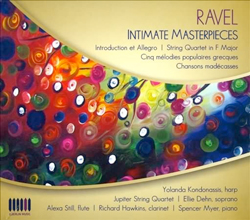by Daniel Hathaway

That somewhere is the special world of Maurice Ravel, charmingly miniaturized in the Oberlin Music release, Ravel: Intimate Masterpieces, a world Kondonassis first discovered through an LP of his music as a child in Oklahoma.
Joined by her fellow Oberlin Conservatory faculty members Alexa Still, flute and Richard Hawkins, clarinet; Oberlin alumni Ellie Dehn, soprano and Spencer Myer, piano; and Oberlin’s most recent ensemble in residence, the Jupiter String Quartet, Kondonassis explores four of Ravel’s exotic chamber works in performances vividly captured by recording engineer Paul Eachus. Sessions were held in Oberlin’s shining new Clonick Hall studio, expertly co-produced and edited by Erica Brenner.
Three of the works date from before the Great War — because of raging stylistic squabbles, a very interesting time for a composer to be writing music in Paris. Ravel’s 1903 String Quartet, obviously stimulated by Debussy’s own sole piece in that genre, fell afoul of both sides in an artistic controversy that Oberlin musicologist James O’Leary recounts in his excellent liner notes. Ravel submitted the work to the Paris Conservatory as well as to the Prix de Rome and was rejected by both. And Fauré, Ravel’s teacher to whom the quartet was dedicated, had some harsh things to say about the piece.
The Introduction et Allegro, from 1905, resulted from another kind of crossfire, in this case a commercial rivalry. Technological advances in harps led the firm of Pleyel to commission Debussy for a piece to show off their new chromatic instrument. The result was the Danse sacrée et Danse profane. The Érard company responded by asking Ravel for a similar work to spotlight the capabilities of its own double-action pedal harp. Ravel seems to have thought so little of the piece that he left it out of his own catalogue and mentioned it in only two letters.
The third pre-war composition, Cinq Mélodies Populaires Grecques has a similarly intriguing back story. In 1904, Ravel, who had already arranged some folk songs from Corsica before the turn of the century, was asked on short notice by the critic Michel Dimitri Calvocoressi to supply half a dozen songs to illustrate a lecture by Pierre Aubry at the École des Hautes-Études Sociales about the songs of oppressed peoples — in this case, of the Greeks and Armenians. Thirty-six hours later, the arrangements were in hand. Calvocoressi and Ravel added three more for another series of lectures in 1905-1906, and a selection of five of the songs for voice and piano was published in French translation in 1906. With Ravel’s approval, Carlos Salzedo arranged the set for voice and harp in 1930.
A fourth set of pieces on the CD came later, in 1925-1926. The three Chansons Madécasses (Madegascan Songs), which set texts by Évariste de Parmy, were dedicated to American patroness Elizabeth Sprague Coolidge. They speak a later, more refined harmonic dialect than Ravel’s earlier, quasi-modal music, and the composer seems to have been especially proud of them to the end of his life.
Interesting as it may be, you don’t really need to know any of the foregoing to take complete delight in this recording. The performances are ravishing and speak to the soul with a refreshing immediacy.
In the Introduction et Allegro, Ravel’s ear for texture and color creates a sense of opulence far beyond what one would expect from string quartet, flute, clarinet and harp. Alexa Still and Richard Hawkins establish a gold standard for blend from the opening notes. An easy, supple sense of movement pervades the whole piece, with beautiful handoffs of melodic material between instruments. Yolanda Kondonassis’s nuanced, langorously paced harp cadenza crowns a work that must have served as an eloquent commercial for the Érard firm
In the string quartet, the Jupiters (Nelson Lee & Meg Freivogel, violins, Liz Freivogel, viola & Daniel McDonough, cello) make lovely contrasts between rhythmical and lyrical sections, react like chameleons to Ravel’s color changes, and match timbres with distinction. Had Fauré heard their version of the finale, he would surely have retracted his comment that it was “stunted, badly balanced, in fact a failure.”
Ellie Dehn brings a clear, colorful voice and a keen sense of drama and humor to both sets of songs. Spencer Myer, Alexa Still and cellist Daniel McDonough are sensitive musical companions in the Madagascar songs. Rounding out the album, Yolanda Kondonassis provides a sprightly, flawless harp underlay to the Greek songs. The final track is indeed Tout gai!, wrapping up this intimate collection of Ravelian delights with lilting Tra-la-las. As promised, Ravel: Intimate Masterpieces takes you on a special journey, one you can enjoy over and over again.
Published on ClevelandClassical.com July 15, 2014.
Click here for a printable copy of this article.


